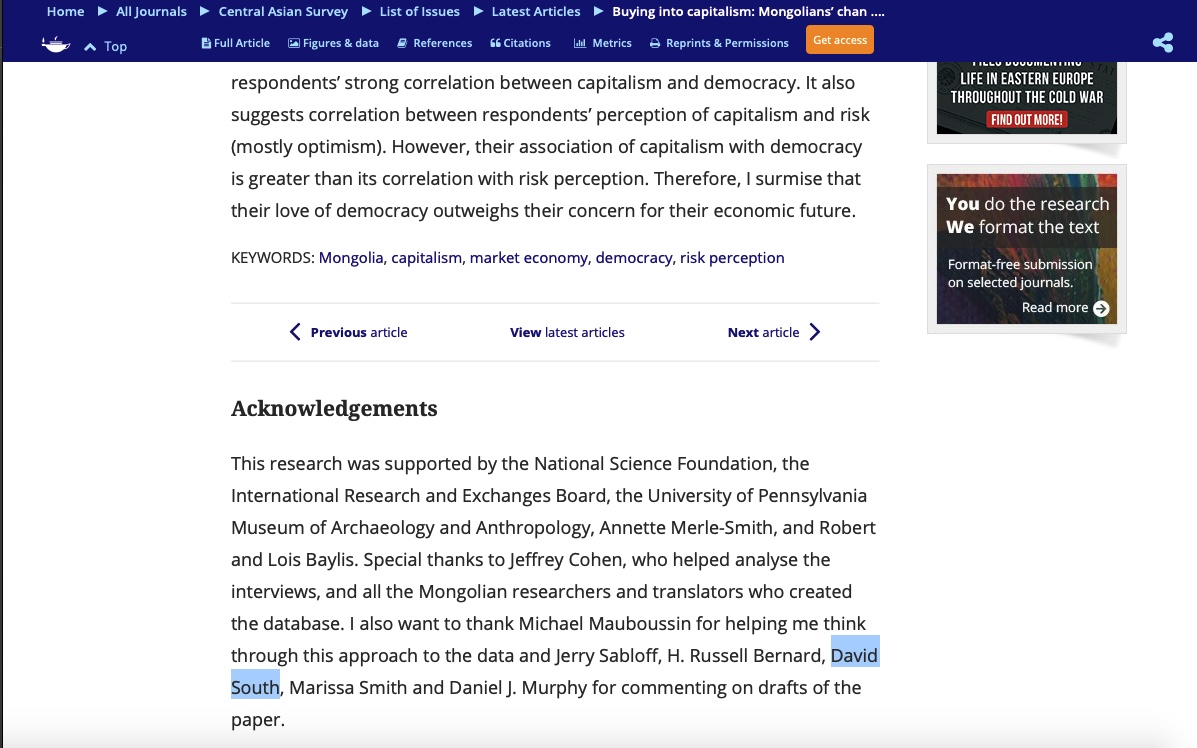Starting from Scratch: The Challenge of Transition
 Friday, June 12, 2015 at 2:44PM
Friday, June 12, 2015 at 2:44PM
By David South (Canada), UNV Information Officer, UNDP, Mongolia
UNV News #78 November 97
After seven years of transition to a market economy, Mongolia – a former satellite of the Soviet Union that has had a democratic government since 1992 – has been profoundly changed. Where it once had a rigid communist government and few contacts with the west, Mongolia has pursued rapid economic, political and social liberalisation. Mongolia has a small population – 2.3 million – spread out over a vast territory wedged between Russia and China.
Communication has in many ways deteriorated over the past seven years as the old communication networks from the communist era have not been fully replaced by the private sector. More and more it became apparent that government and the private sector were almost working in the dark in understanding how transition has affected Mongolians.
In partnership with the Mongolian government, UNDP initiated the researching of Mongolia’s first human development report back in the middle of 1996. It was launched on September 5 of this year, with UNVs playing a key role. To lead the team in producing the report, British poverty specialist and UNV Shahin Yaqub was brought in. Only 29-years-old – one of the youngest UNVs in Mongolia – Yaqub joined a rapidly expanding UNV presence in the country. There are now 24 international UNVs and 26 Mongolian UNVs deployed throughout the country in UNDP’s projects.
The thirst for expertise in Mongolia – a country undergoing the growing pains of transition to a market economy – has placed high demand on UNVs. UNVs occupy senior roles in all of UNDP’s projects.
The 1997 Mongolian Human Development Report is a prime example of the important goal of capacity building conducted by the UNDP. For Yaqub, the report’s principal author, it was like starting from scratch. A poverty research office had to be set up before the work could begin. A team of Mongolia’s top statistical researchers had to be trained in the latest methodologies for social research.
Yaqub was excited by the project. He said: ”There was no office when I first came. We had to organise the office to understand who does what and basically create the focal point for poverty analysis in Mongolia”.
Yaqub also had some of his basic assumptions tested. The small population of this country – only 2.3 million – had meant the previous communist regime was able to build up a large archive of statistics on the population. A good portion of the information was not up to international standards, but it potentially represented a wellspring of data to start from. “Mongolia is number-rich. To even have that kind of data is very rare for a developing country. But unfortunately we found all this information was stored on Russian mainframe computers that didn’t work anymore!”
During the actual production of the report, Yaqub was joined by three more UNVs: Mustafa Eric, a Turkish journalist working with the Press Institute of Mongolia, Jerry van Mourik, a Dutch journalist now working as the Support Officer to the United Nations Resident Co-ordinator, and UNDP Information Officer David South, a former journalist with the Financial Times in London, England.
The high-profile role played by media UNVs was crucial if the report was to not end up collecting dust on a government shelf. The report is a repository of essential and new information on the state of human development in Mongolia, including data showing rising poverty rates and serious threats to food security. Like all human development reports produced by UNDP, it was not meant to be a prescriptive tract, but a lubricant for a national debate on sustainable development in Mongolia. This altered the design and presentation of the report.
Instead of looking academic, the report took on the appearance of a magazine, from its cover to colourful children’s paintings inside. UNV Mustafa not only assisted with the report’s design and production, he also used his contacts in the Mongolian media to ensure the report was distributed across the country. UNV van Mourik assisted with publicity, including producing an emotionally-charged television commercial weaving together vignettes from Mongolia’s recent history to tell the story of human development.
Already in its second print run in both English and Mongolian, the report has been adopted as their study guide by Mongolians wanting to learn English.
“Mongolia is a rewarding place to work,” said Yaqub. “As a technical specialist and UNV, what you bring to the job is valued. I researched poverty for five years before coming to Mongolia and I felt I had something to contribute. But I also realised I had something to learn as well. You always have to keep in mind you are bringing your own baggage to the job – be it cultural, emotional or intellectual. Coming from an academic background, I was not afraid to be told I was wrong.”
Yaqub, who had worked in poverty analysis in the Philippines and Bangladesh before coming to Mongolia, will never forget the country that sparked his new passion: horses.
“You give up things as a volunteer – your time, your income, all the things you took for granted back home. But what you give up is compensated by rewarding work and good friends. When I learned to ride a horse, I can place it directly and clearly to Mongolia – that memory will always be with me.”
Just before Yaqub left Mongolia for work with UNDP in New York, he participated in a series of public debates in one of Mongolia’s poorest provinces, Khuvsgul aimag. The public debates are used to introduce the report to the grassroots while sparking discussion on sustainable human development.
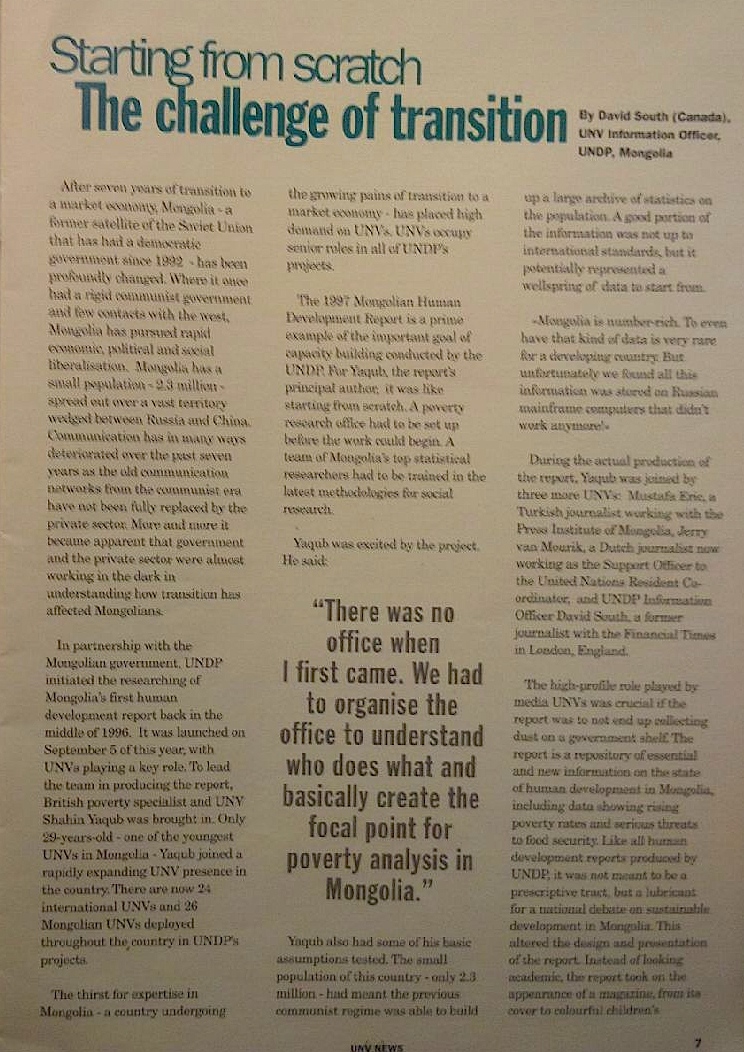 "Starting from scratch: The challenge of transition": UNV News, November 1997
"Starting from scratch: The challenge of transition": UNV News, November 1997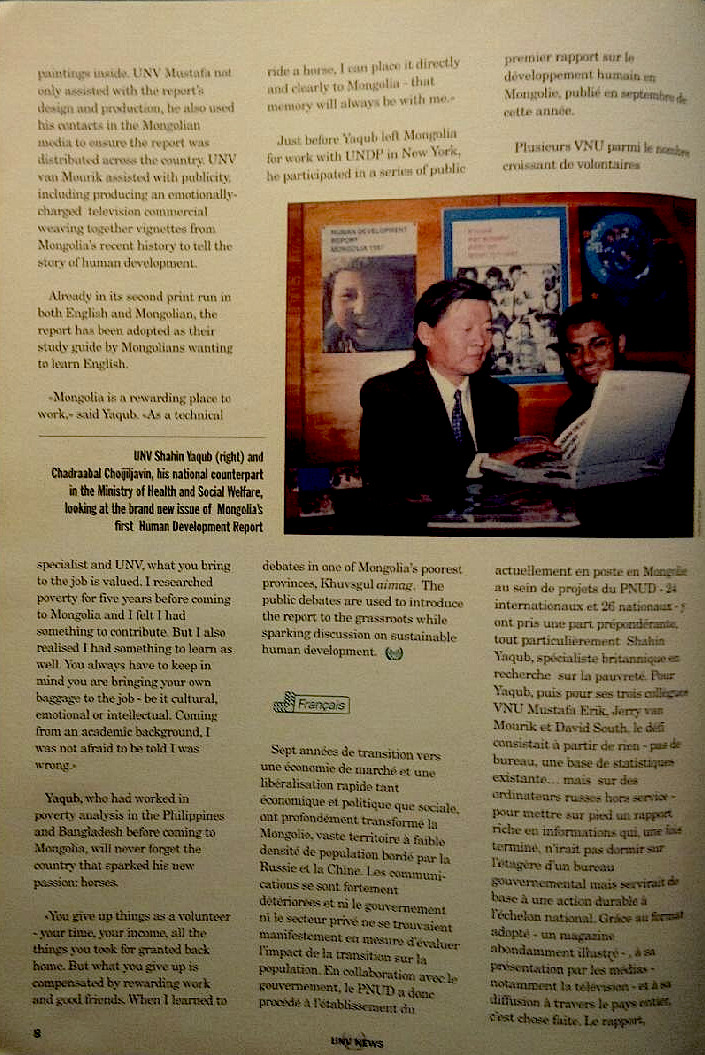
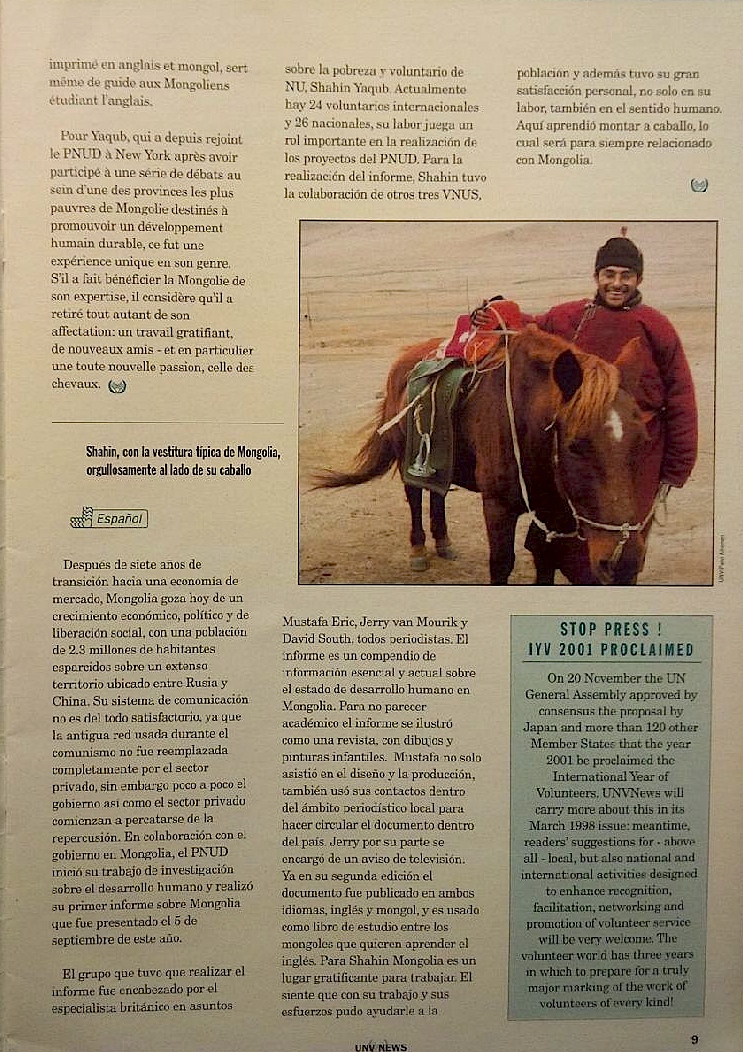
This work is licensed under a
Creative Commons Attribution-Noncommercial-No Derivative Works 3.0 License.


 David South
David South
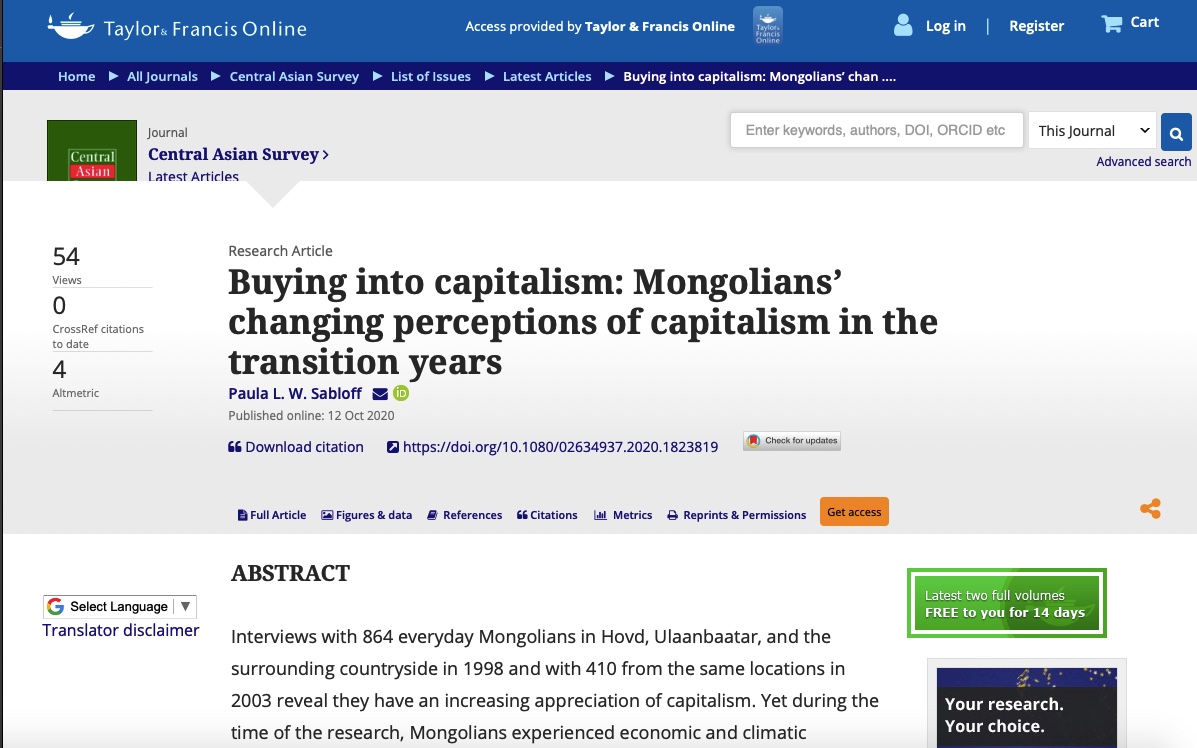 Buyng into capitalism: Mongolians' changing perceptions of capitalism in the transition years by Paula L. W. Sabloff (12 Oct 2020).
Buyng into capitalism: Mongolians' changing perceptions of capitalism in the transition years by Paula L. W. Sabloff (12 Oct 2020).
It was a pleasure to have the opportunity to comment on a draft of Buying into capitalism: Mongolians' changing perceptions of capitalism in the transition years by External Professor Emeritus Paula L. W. Sabloff from the Santa Fe Institute (12 Oct 2020: Central Asian Survey).
"A political anthropologist, she uses complex-systems tools to analyze three different databases: Mongolians’ changing ideas on democracy and capitalism, the emergence of early states all over the world, and 19-20th century Cozumel."
The Santa Fe Institute "is the world's leading research center for complex systems science."
 1997,
1997,  By David South,
By David South,  Human Development Report,
Human Development Report,  Mongolia,
Mongolia,  UNDP,
UNDP,  big data,
big data,  communism,
communism,  data,
data,  free markets,
free markets,  market economy,
market economy,  statistics,
statistics,  transition in
transition in  Agenda 21,
Agenda 21,  Austerity,
Austerity,  Cities,
Cities,  Data,
Data,  David South Consulting,
David South Consulting,  Digital,
Digital,  ICT4D,
ICT4D,  Internet,
Internet,  Magazine Stories 1990s,
Magazine Stories 1990s,  Northeast Asia,
Northeast Asia,  Poor,
Poor,  Shock Therapy,
Shock Therapy,  Solutions,
Solutions,  Strategy,
Strategy,  Trade,
Trade,  UN Innovator Stories,
UN Innovator Stories,  UNDP,
UNDP,  UNDP Innovator Stories,
UNDP Innovator Stories,  UNDP Mongolia,
UNDP Mongolia,  UNV News,
UNV News,  United Nations,
United Nations,  Women,
Women,  Youth
Youth 
